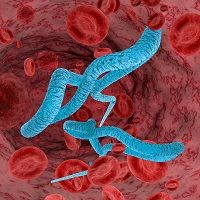Article
Chimerix Announces Progress in Ebola Drug Approval Process
Author(s):
The US Food and Drug Administration (FDA) has approved the use of an experimental drug to treat patients who have Ebola Virus Disease.

The US Food and Drug Administration (FDA) has approved the use of an experimental drug to treat patients who have Ebola Virus Disease.
According to a statement from Chimerix Inc., following requests from treating physicians, the FDA has granted an Emergency Investigational New Drug Application (EIND) for Chimerix’s drug brincidofovir, an oral nucleotide analog.
M. Michelle Berrey, MD, MPH, the company’s president and chief executive officer, said the company is working to fill a void as the Ebola outbreak in West Africa continues to spread, taking thousands of lives.
“Based on in vitro data from work conducted by the CDC and the National Institutes of Health suggesting brincidofovir’s activity against Ebola, we are hopeful that brincidofovir may offer a potential treatment for Ebola Virus during this outbreak,” Berrey said. “Data collected over the years of clinical development of brincidofovir have allowed us to progress this compound into Phase 3 programs for cytomegalovirus and adenovirus infections, and provided information on the safety and dosing of brincidofovir to allow it to be explored as a potential therapy for Ebola Virus Disease.”
Following the approval, the company is “working closely with the FDA to finalize a clinical trial protocol this week to assess safety, tolerability and efficacy of brincidofovir in patients who are confirmed to have an infection with the Ebola Virus.”
Testing conducted at the Viral Special Pathogens Branch of the CDC and the NIH showed that brincidofovir had in vitro activity against the Ebola virus “that was similar to that seen in test tube assessments of brincidofovir against other viral diseases, such as adenovirus and smallpox.” Researchers are also currently conducting tests with brincidofovir using animal models.
Chimerix said brincidofovir “has shown broad-spectrum in vitro antiviral activity against all five families of DNA viruses that affect humans, including viruses in the herpes virus family and adenovirus.” The company recently announced it has initiated a phase 3 clinical trial to evaluate the efficacy of brincidofovir against adenovirus, and is working with the Biomedical Advanced Research and Development Authority “to develop brincidofovir as a medical countermeasure against smallpox.”
The FDA has granted Fast Track status to brincidofovir for cytomegalovirus, adenovirus, and smallpox.
While there are currently no medications approved by the FDA for the treatment of Ebola, there have been several experimental medications used on patients who have been infected with the virus, including ZMapp. Government entities have also aligned with pharmaceutical companies to further develop drugs that can hopefully be used for this and future outbreaks.





